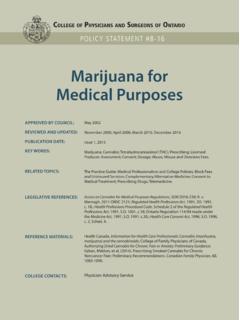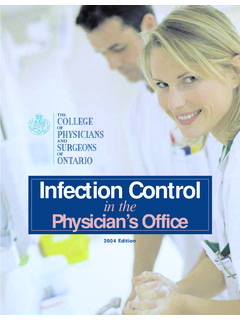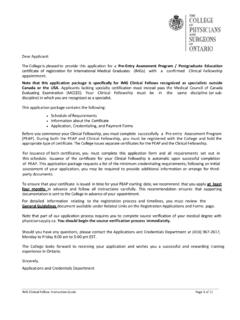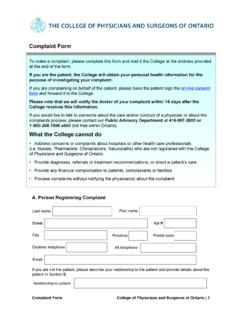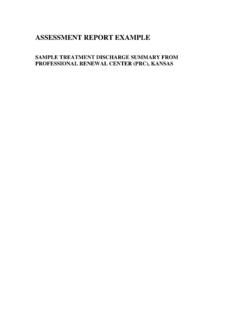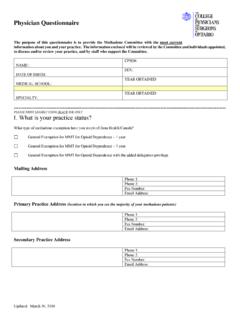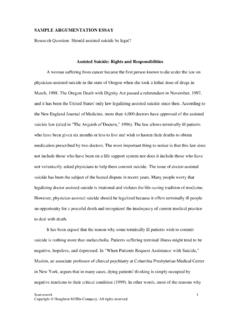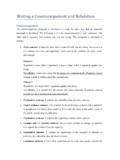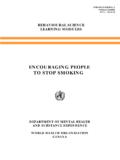Transcription of Medical Coroners Act, the Office of the Chief …
1 In accordance with Ontario s Coroners Act, the Office of the Chief Coroner is notified of all medically assisted deaths in the province. The Office of the Chief Coroner reviews all deaths to assess compliance with legal obligations and can investigate deaths where deemed necessary. By virtue of this role, the Office of the Chief Coroner continues to identify key issues and lessons learned in the course of its review of medically assisted deaths. The information below is informed by the most recent information from the Office of the Chief Coroner. It includes links to resources that will assist physicians in fulfilling their professional and legal obligations relating to Medical assistance in dying .
2 In keeping with physicians professional and legal obligations with respect to Medical record keeping, all physician-patient en-counters concerning Medical assistance in dying must be documented. Physicians Medical record keeping obligations are set out in the College s Medical assistance in dying and Medical Records policies. Physicians who provide Medical assistance in dying must report the medically assisted death to the Office of the Chief Coroner (the Coroner ). In fulfilling this reporting obligation, physicians would typically submit the section(s) of the patient s Medical record pertaining to the medically assisted death. The Coroner will use the information contained in the Medical record to deter-mine whether the medically assisted death will be subject to further investigative College s Medical assistance in dying policy sets out a number of record keeping requirements.
3 Physicians who are involved in assessing a patient s eligibility for Medical assistance in dying must: Document all oral and written requests for Medical assistance in dying , and the dates of these requests; Include a copy of the patient s written request for MAID in the Medical record; Document each element of the patient s assessment in the Medical record; and Include a copy of their written opinion about patient eligibility in the Medical record. Where Medical assistance in dying is provided, physicians must also record the following in the Medical record: The start and end-date of the required 10-day reflection period between the patient s signed request for Medical assistance in dying and the date on which Medical assistance in dying is provided; Where the reflection period is shortened, the specific statutory exception that has been relied upon (patient s death is im-minent or patient s loss of capacity is imminent) and the information/ observations that support the clinicians opinion that the exception was satisfied ; The time of the patient s death.
4 And The medication protocol utilized ( , drug type(s) and dosages).In circumstances where a physician declines to provide Medical assistance in dying , the physician must document that an ef-fective referral was provided to the patient, as well as the physician, nurse practitioner and/or agency to which the referral was directed. Medical assistance in dying : Updated Lessons Learned1. RECORD KEEPING: Good record keeping is critical for effective practice in the context of Medical assistance in dying and for meeting physicians mandatory reporting obligation to the assistance in dying : Updated Lessons LearnedThe requirement for a reflection period is set out in federal law.
5 It is captured in Step 6 of the Process Map included in the College s Medical assistance in dying policy. Federal law requires that 10 days pass between the day on which the patient s written request for Medical assistance in dying is signed, dated and witnessed, and the day on which Medical assistance in dying is provided. Physicians are reminded that, under law, the 10-day period may only be shortened if both the providing practitioner and practitioner confirming the patient`s eligibil-ity agree that: 1. The patient s loss of capacity is imminent; and/or2. The patient s death is imminentIt is contrary to federal law to shorten the 10-day reflection period for any reason other than the two circumstances outlined above.
6 For example, it would be contrary to federal law to shorten the 10-day reflection period due to pressure from the patient and/or their family indicated above, physicians must document in the Medical record, the start and end-date of the 10-day reflection period, and where applicable, the statutory exception relied upon in shortening the reflection period and the information/ observations that support the clinicians opinion that the exception was REFLECTION PERIOD: The 10-day period of reflection between the date Medical assistance in dying is requested and the date it is provided, may only be shortened in two assist with record keeping in the Medical assistance in dying context, the Ministry of Health and Long-Term Care has devel-oped forms for use by physicians and/or patients where a medically assisted death is sought.
7 Physicians are advised that Ministry forms do not capture all of the information that they are required to document to comply with the College s policy and with their mandatory reporting obligation to the Coroner. As such, these forms serve as supplementary aids to help promote good record keeping in the Medical assistance in dying context but do not replace record keeping or mandatory reporting obligations. Where these forms are utilized, they form part of the patient s Medical record and must be submitted to the Coroner in addition to the information required to satisfy the mandatory reporting obligation. CLICK HERE for patient request formCLICK HERE for physician provider formCLICK HERE for second physician formWhen?
8 The patient s written request for Medical assistance in dying must be signed in front of two independent witnesses, who must also sign and date the patient s request. The patient s written request must be witnessed at the time that the patient s written request is made, not at a later time and/or date. This means that the date on which the patient s written request is signed will always match the date on which the written request is witnessed. It is wholly inappropriate for the patient s written request to be witnessed at a later time/date. Doing so contravenes federal Whom?The federal law includes safeguards regarding who can and cannot witness a patient s written request for Medical assistance in dying .
9 This safeguard is outlined in Step 3 of the Process Map in the College s Medical assistance in dying policy. The witness must be independent of the patient requesting Medical assistance in dying . An independent witness IS: at least 18 years of age and understands the nature of the request for Medical assistance in independent witness IS NOT: a beneficiary or recipient of any financial or material benefit resulting from the patient s death; the owner of the health care facility where the patient is being treated, or directly involved in the patient s healthcare or personal care. Physicians should be aware that a healthcare provider in the facility where the patient has requested Medical assistance in dying can be a witness as long as this individual: does not own the facility; and is not directly involved in the patient s healthcare or personal WITNESSES TO THE PATIENT S WRITTEN REQUEST: WHEN AND BY WHOM?
10 : The patient s written request must be witnessed at the time the patient s written request is made, not at a later time and/or date. A healthcare provider in the facility where the patient is being treated may serve as an independent witness, as long as that provider is not directly involved in the patient s care. 4. COORDINATION AND COMMUNICATION: Coordination and communication among all health professionals involved in the provision of Medical assistance in dying is essential. Medical assistance in dying : Updated Lessons LearnedThe provision of Medical assistance in dying requires the involvement of multiple healthcare practitioners. Communication and coordination among practitioners involved in an assisted death case, either in assessing the patient, confirming the patient`s eligibility, or providing Medical assistance in dying is of paramount importance.


